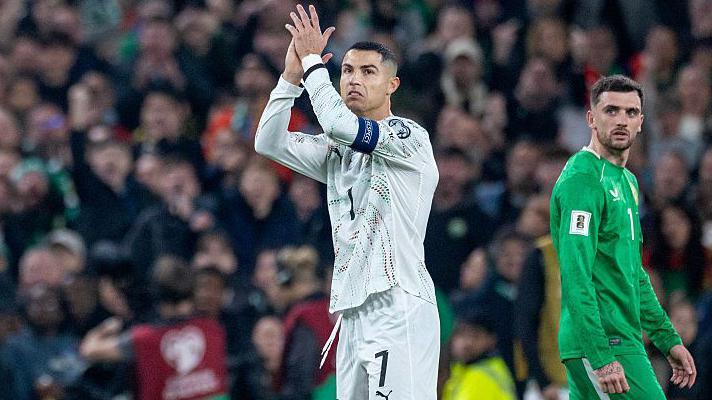- 108 Comments
It raised eyebrows, but probably didn’t come as a huge surprise. Cristiano Ronaldo is available to play for Portugal in their opening matches at the World Cup, despite his red card against the Republic of Ireland.
Why? Because Fifa decided to suspend for one year the final two matches of his suspension.
Under Fifa’s disciplinary code for violent conduct, Ronaldo should have received a three-match ban for elbowing Dara O’Shea during Portugal’s 2-0 qualifying defeat earlier this month.
Yet Fifa’s disciplinary committee said it took into account that he had not received a red card in his other 225 international appearances.
He served one match in the final qualifier against Armenia. The other two will only be activated if he “commits another infringement of a similar nature and gravity during the probationary period”.
So Ronaldo is free to join arch rival Lionel Messi at the World Cup in the United States, Mexico and Canada next summer.
Does Fifa have the right to suspend Ronaldo’s ban?
In short, yes. There is a clause in the disciplinary code which effectively gives Fifa the right to cut or cancel any ban as it sees fit.
Article 27 says Fifa can “fully or partially suspend” a disciplinary measure for “a probationary period of one to four years”.
Has any other player had a ban suspended to play at the World Cup?

There has not been a World Cup reprieve quite the same as Ronaldo’s, where a three-match ban has remained in place but partially suspended.
But there several other examples of Fifa looking kindly upon players, reducing their ban from the mandatory punishment.
The World Cup finals are the pinnacle of most players’ careers. Articles 25 and 27 give Fifa the freedom to consider the merits and impact of a suspension. And it’s not only been about star players.
In 2014, France defender Laurent Koscielny was sent off for slapping Ukraine’s Oleksandr Kucher in the first leg of the World Cup play-off.
Like Ronaldo, Koscielny was automatically banned for his country’s final qualifying fixture. Fifa then chose not to extend the Arsenal centre-back’s suspension beyond one match, allowing him to play at the World Cup.
Croatia’s Mario Mandzukic should have missed the opening two games of the 2014 finals after he was sent off for serious foul play in the second leg of the play-off win over Iceland.
Fifa gave him a one-game ban, meaning he could play the second match against Cameroon – a 4-0 win in which he scored twice.
Towards the end of qualifying for the 2006 World Cup, Netherlands midfielder Phillip Cocu was sent off for an alleged retaliatory elbow on an Albania player.
Fifa chose to ban Cocu for two matches, meaning he missed the final Uefa qualifiers against the Czech Republic and Macedonia, but was free for the opening match of the World Cup.
Japan’s Makoto Hasebe was sent off for an elbow at the end of qualifying for the 2010 World Cup, and like Cocu was given two matches. He was not so lucky, however, as the second match was the first game of the World Cup.
Likewise, Iran’s Saeid Ezatolahi was sent off for bringing his boot down on the head of an opponent in their penultimate qualifier. Fifa chose to give the midfielder two games rather than three, and he missed just the first game at the 2018 World Cup.
In 2002, Mexico midfielder Jesus Arellano was given a three-match ban for violent conduct against Costa Rica. He missed the final qualifier against Honduras and was set to sit out the first two matches of the World Cup.
- 1 day ago
- 8 hours ago
- 23 hours ago
What about James and Rooney?
England midfielder Lauren James was sent off at the 2023 Women’s World Cup for standing on the back of Nigeria’s Michelle Alozie.
James feared she would get a three-match suspension, meaning she would be ruled out for the remainder of the tournament.
But Fifa decided to give James two games and she was able to return as a substitute in England’s 1-0 final defeat by Spain.
England also had success with Wayne Rooney’s suspension for Euro 2012.
The Manchester United striker was given a three-match ban for kicking Miodrag Dzudovic during a 2-2 draw with Montenegro in the final qualifier.
Have any players not been so fortunate?
There are a few cases, and players who are sent off in their last competitive game before the finals will always miss at least one game.
At the 2006 World Cup, Germany striker Mike Hanke was very unlucky.
A year earlier, Hanke had been sent off for serious foul play against Mexico in the third-place play-off at the Confederations Cup.
Germany didn’t have another competitive game for a whole year, as hosts of the 2006 World Cup, but Fifa stuck with the mandatory two-match ban.
Hanke was still picked for the squad even though he was suspended, and made one 19-minute appearance – ironically in another third-place play-off – as Germany beat Portugal.
In October this year, Qatar centre-back Tarek Salman was sent off in the second leg of his country’s final qualifier against the United Arab Emirates and given the statutory two-match suspension for serious foul play.
Ecuador’s Moises Caicedo and Argentina’s Nicolas Otamendi will have to sit out the first game of next year’s finals after being sent off for two bookable offences in their final qualifying matches.
The same fate was suffered by Colombia’s Fredy Guarin in 2014 and Serbia and Montenegro’s Nemanja Vidic in 2006.
Related topics
- Football
- FIFA World Cup
- Portugal
- 17 October

- 16 August

Source: BBC

Leave a Reply